Imagine the following scenario. The first batch of Martian colonists has settled on Mars. There are only ten of them currently residing on the Red Planet, both men and women, living together in a confined station only a few meters across.
They see each other first thing in the morning, they share their meals, they work together, they have only each other to talk to and spend their free time with. The contact is incredibly close and intense – it’s no surprise that they soon start feeling like much more than just co-workers, more like a family, as if they have known each other for ages.
Add the pressure of the hostile alien environment and the notion that anything can go wrong at any time making them dependent on each other for their very lives, and you get an intensity of emotions that one would hardly ever experience on Earth and that may bring about some surprises even for these well trained, rational astronauts.
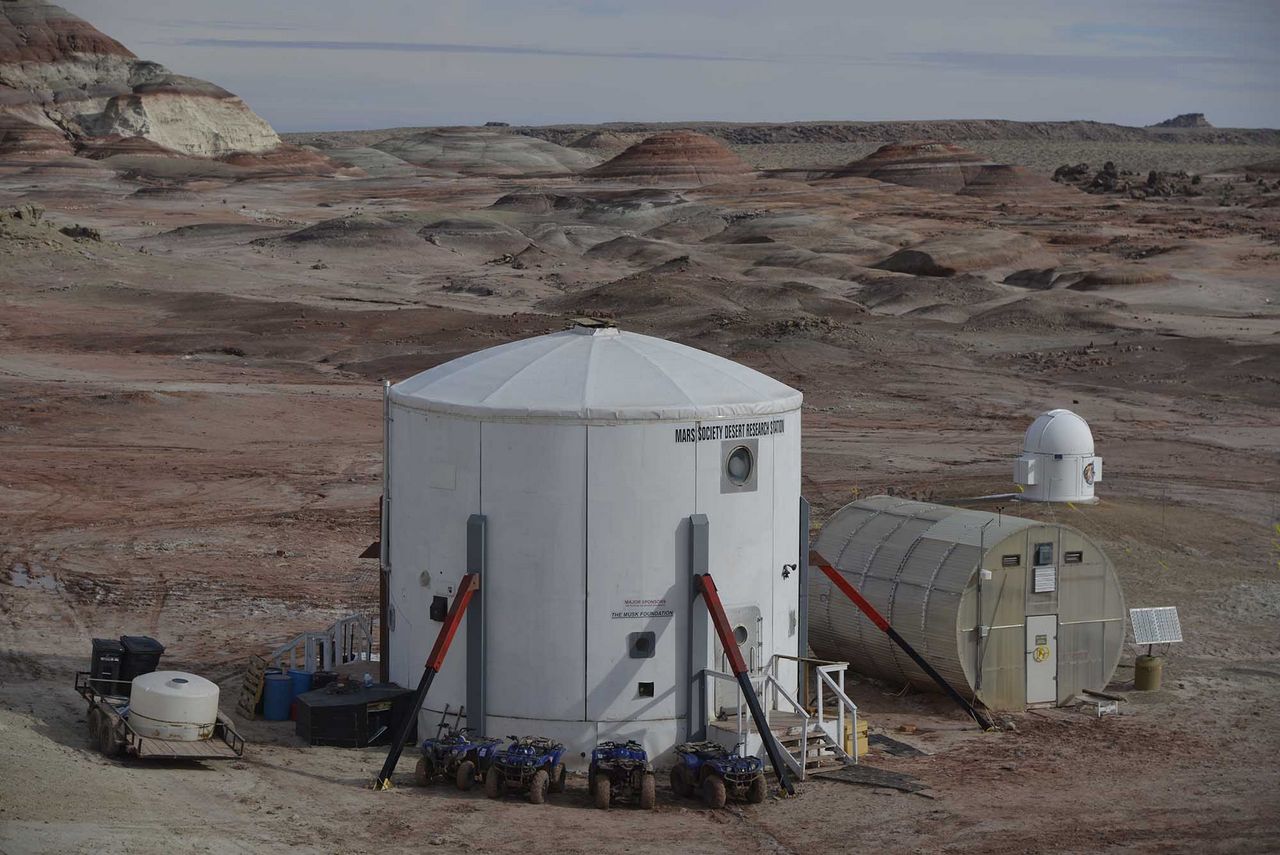
The Mars Desert Research Station in Utah is based on a concept of a realistic mission to Mars. – Credits: Filip Koubek
At the end of the day, they are not robots. One can’t blame them for having basic human needs – like the occasional hug (even little monkey babies have been scientifically proven to require a warm mother’s touch to develop nor- mally) and, of course, sex (even though NASA strictly prohibits that).
“The bottom line is that, like hunger and thirst, sex is a basic biological motive,” Jason Kring, human factors researcher at Embry-Riddle Aeronautical University, said in an interview with the Sunday Telegraph in 2008. “The potential round-trip mission to Mars could take three years. It doesn’t make sense to assume that these men and women are going to have no thoughts of it for three years.”
Kring suggested a solution that he said was frequently used by polar explorers: temporary relationships with colleagues that end with the mission. “You have an exclusive relationship with them for six to nine months but when the expedition is over, so is the relationship and you return to your normal lives and families,” Kring told the Sunday Telegraph.
And that’s what some in our fictional crew did.
It worked well for a while, until about halfway through the mission when one of the Martian couples started falling apart. What exactly happened was that Astronaut A discovered his space-girlfriend Astronaut B was spending a suspicious amount of time with Astronaut C while growing increasingly distant towards himself, even refusing to have sex under the pretext of a severe headache or fatigue.
Having received some troubling news from Earth the very same week (his mother was diagnosed with cancer) and already feeling tired, lonely, and borderline depressed, Astronaut A snapped and attacked his love rival. The fist fight resulted in some damaged scientific equipment (non-critical) and a broken jaw for Astronaut C.
– In the video below, a History channel documentary about sex and reproduction in space, an activity that presents some… unexpected ballistic implications.
[cleveryoutube video=”dSUEOXEdHIw” vidstyle=”1″ pic=”https://www.spacesafetymagazine.com/wp-content/uploads/2014/10/Screen-Shot-2014-10-06-at-19.08.42.png” afterpic=”” width=”” quality=”inherit” starttime=”” endtime=”” caption=”” showexpander=”off” alignment=”left” newser=””]
Lisa’s Story
All of us who work in environments with people have seen examples of this happen in our workplace where two people date, have a relationship, which then ends and afterwards it can become uncomfortable or even a cause for conflicts,” Kring tells Space Safety Magazine.
“On the other hand, astronauts selected for the American astronaut group go through a lot of screening, physical, but also some psychological screening. There is a high degree of professionalism in these astronauts. These men and women have spent their entire careers through education and training to get to this point, when they get the chance to go to Mars or to the International Space Station and the mission importance is going to outweigh any issues they might have with their romantic relationship,” Kring says.
Such an explanation would have sounded quite satisfying if it hadn’t been for that notorious precedent – the tragic Lisa Nowak story.
With a plot of which any psychological thriller writer need not be ashamed, the story, detailed on front pages of newspapers around the world, involves two astronauts, a NASA collaborator, and an unsuccessful murder attempt.
How the hell could that have happened? NASA officials must have been asking when they watched how Lisa Nowak – the focused, talented, good- looking flight engineer – plummeted from the pedestal of an American national hero and crumbled into a pitiable mental wreck.
Unbeknownst to NASA, Lisa, a seemingly happily married mother of three, had fallen for fellow astronaut trainee William Oefelein and enjoyed a secret two-year affair with him. However, not long after her triumphant July 2006 return from the International Space Station where she spent 13 days as part of the STS-121 mission operating the Space Shuttle’s robotic arm during several space walks, Oefelein dumped her for US Air Force cadet Colleen Shipman.
Despite the confident and at-ease persona she outwardly projected, something cracked and barely seven months after her return Lisa found herself driving 1,500km from Houston to Orlando, Florida where she attacked Shipman with pepper spray, wearing a wig and a hooded trench coat. Police later found in her car a BB pistol and ammunition, a 2-pound drilling hammer, black gloves, rubber tubing, and plastic garbage bags.
It may be convenient to blame the faulty Lisa for the disgrace, the regrettable stain on the squeaky clean reputation of the US astronaut corps. But how can we be so sure that this scenario can’t happen to anyone else, given just the right amount of pressure and the correct trigger? At the end of the day, as did every other astronaut, Lisa too passed the rigorous psychological testing of NASA’s astronaut selection process.
Simulation Experience
I think it is really important to avoid any romance in the crew because it can create tension,” says Lucie Poulet, a 28-year old aerospace engineer and participant in a four-month Mars analog mission at the HI-SEAS habitat in Hawaii. “Most people don’t handle very well romance in such an isolated environment and when things go wrong between the two people it can really create tensions in the group itself.”
Poulet may have reason to be so sceptical about Martian romance. Just one month before the start of her HI- SEAS experience, she took part in another simulation – a two-week stay at the Mars Desert Research Station (MDRS) as part of Crew 135 (of which the author of this article was also a member).
Surprisingly, the short-term mission proved to be more stressful in many aspects than the long term one and only one week after it began, the strain took its toll on the crew.
“In HI-SEAS, we had more time to settle the experiments and collect the results, the workload was spread over a longer period of time and therefore the levels of work-related stress were lower at HI-SEAS than at the Mars Desert Research Station,” Poulet says. “At MDRS, we all were quite stressed most of the time.” Combine that with the fact that, unlike in HI-SEAS, the crews of MDRS were completely self-selected and not subject to any psychological evaluation, and it may not be surprising that some individuals could turn into psychological ticking time bombs.
At the core of Crew 135’s near disintegration was a romantically involved couple. One half of the couple, unbeknownst to the rest of the crew, turned out to have a tendency to somewhat volatile emotions, perhaps related to insecurities in the relationship or some earlier traumatic experiences.
The couple didn’t form during the mission but arrived already together. From early on, the other crew members noticed a certain tendency of the couple to isolate themselves from the rest, spending most of their time exclusively in each other’s company (quite a feat in the confined environment of the Utah-based station, which doesn’t provide much room for privacy).
Looking back, there probably were some signs of tension between the affected crew member and the rest of the team. However, at the time, no one considered those signs disconcerting and all were taken completely by surprise when the crew member suddenly packed his baggage and left the station without saying a word. The crew finished the mission short of one person.
“I think people have to be really careful. If things go wrong in a relationship, they have to be adult enough so it doesn’t create a problem in the mission itself,” comments Poulet. “They should be able to continue as if nothing had happened and that can be really difficult. I hope that the crew which is selected to go to Mars is mature enough to be able to do that. If you engage in a relationship with one of your crew members during a Mars mission, you have to be conscious that if things go bad, you will have to take everything on yourself and not share it with your crew mates because it could ruin the mission.”
While it may be rather simple to avoid exes of all kinds on Earth, it’s absolutely impossible in a confined space station.

The Mars Desert Research Station in Utah is based on a concept of a realistic mission to Mars. – Credits: Filip Koubek
How to Avoid Sex and Romance on Mars
Would a unisex crew be safer than a mixed one, then, despite the talk of the better productivity of combined teams? As both Lucie Poulet and Jason Kring note, even a unisex crew wouldn’t, by default, be immune to romantic relationships.
“I don’t think the solution is going with the all-male or all-female crew either,” Jason Kring says. “I think it just has to be accepted that these are adults and if they are in a space vehicle for a long period of time that there is probably a chance of some relationships forming and those may not end well. But my hope is that every single person in that crew would agree that they will do what is the best for the mission, even with that potential problem.”
It is not known whether NASA changed its psychological evaluation processes following the Lisa Nowak affair. However, as Jason Kring says, there are too many qualities required from an astronaut candidate; making sure they are not attracted to any of their crew members is probably not very high on NASA’s selection check list.
“If you are selecting people for a long duration mission, either for a flight to the International Space Station or for a round trip to Mars, the primary consideration is always the technical expertise of the individuals as well as how well the crew gets along in terms of team performance,” Kring explains.
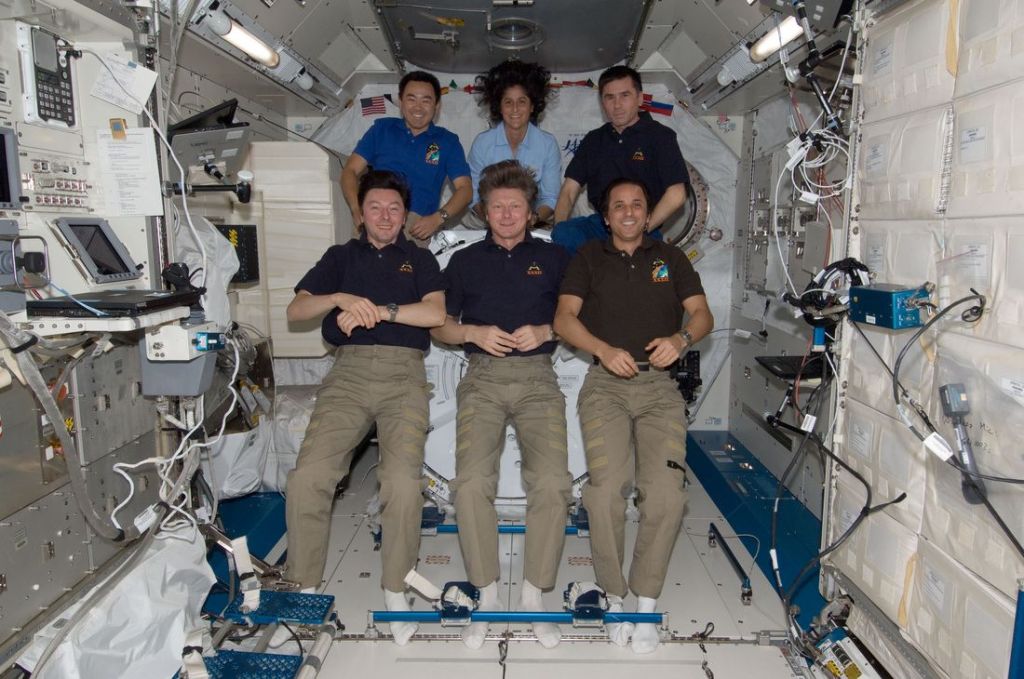
Astronauts in space live in extremely close quarters. A long term deep space mission would present the issue of romantic and sexual relationships between crewmates. – Credits: NASA
“For a mission to Mars in particular, you would also look for people who are very content in a very boring environment and by that I mean that I don’t want someone who needs a lot of stimulation, who needs to see new things. You want people who are introverted, who would be OK to stay for months inside a small spacecraft during the journey to and from Mars. And I think you would also need people who are relaxed and are not going to be too worried about an environment that might be too cluttered or not quite in order. Someone who is obsessive compulsive over cleanliness or order may not do well in this environment.”
NASA plans to send humans to Mars sometime during the 2030s. The highly advertised Mars One one-way mission wants to achieve this feat in only ten years, which still leaves enough time to fine-tune the psychological personality mix. Omitting this important step could easily turn a very expensive mission into a cheap soap opera or, in the worst case, into a psychological thriller.
What is your take on sex and romance in space? Leave a comment below!
Editor’s note: At the request of the Mars Society, we advise the reader that in 12 years of operations at MDRS, no crew member has reported being assaulted by another member of the crew.

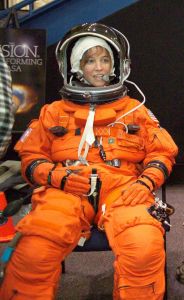
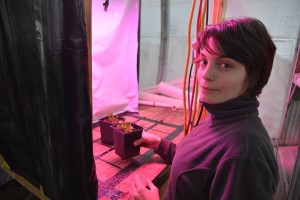
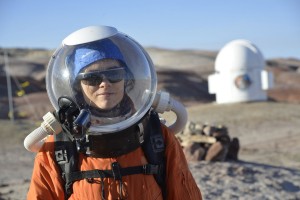









Keep a larger sample crew together in simulated conditions for a few months and then pick a subset of the sample crew for the actual mission based upon their ability to interact without problems.
Assume relationships will form and develop procedures to deal with the most common fallout. All in all the astronauts should be able to cope with disillusionment as well as with joy.
I always assumed that these scientists had great knowledge… but then why haven’t they thought of the possibility of a vasectomy for all male passangers?
The main problem here is not to avoid pregnancies, but to avoid possible complications related to emotionally charged relationships in confined environments. A vasectomy would take care of the first, but still leave the second unsolved
accept
I thought they were sending grown ups… I’m in a band with my ex and I work with his “new” girlfriend that he cheated on me with while we were dating. And we get along completely fine. It hurt, but we spoke it out. From then on I knew I had to enter a relationship from a distance and let logic and reason overweigh emotions. And those four have to use the same tactics. They’re going to be isolated alone till the end of their lives, just the four of them. It is possible to have a romantic relationship without emotions. After a while, they will start feeling like a family, which is awkward, but they won’t live that long anyways due to the lack of resources and radiation poisoning.
I believe you are right: you need to select adults, and very stable ones. But being human nature what it is (and considering the unprecedented level of isolation and pressure a crew is likely to undergo), I still wonder what could go on. Personality tests can reveal your current ability to react, based on your past history. But I believe there are ways to cope with being angry, upset, disappointed, or broken-hearted here on Earth that you simply don’t have in a similar situation.
Wonder if artificial hormones were considered, similar to those given to convicted rapists–“chemical castration.” Could be developed for male or female astros?
But hormones have side effects too.
We should ask MarsOne volunteer what they would think about this perspective 🙂
Anyone who signs up for a one-way suicide mission to Mars must be terminally screwed up already. Conflict is inevitable.
Id sign up for mars one way mission if and only if:
1. It is me + 3x supermodels in the colony
2. NASA sends fresh batch of 2x supermodels every few years for me to impregnate for the colonization efforts.
Why would any supermodel want to go with you?
Send stable married couples, and Bibles.
Human nature and Nature always wins in the end. No amount of conditioning or training can stop it.
Nature always wins in the end.
haha!
A crew spending years in space should be an equal mix of male and female. The group should be honed over years of training and simulated isolation. They would need to be extremely close friends who are able to cater for their colleague’s needs, including sex. A “friends with benefits” style situation would be the most logical route to go down, with partners rotated to avoid jealousy – but obviously in a very easy going manner. To ban sex in space is completely unworkable and romantic relationships should be banned.
I’m going to beat my meat colnel( female) I’d appreciate it if you made it go away down your throat. Nothing fancy. I’ll do the same for you some time. That I can gaurentee will happen. If you don’t think so you’re all lying highly educated people with your head in the sand.! tell me Pultarova wouldn’t love what i just described,??!! You’re welcum.
Why would anyone go with you ?
It isn’t colonization if there aren’t children born or attempted.